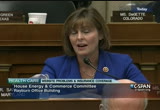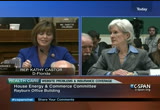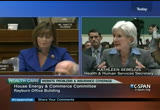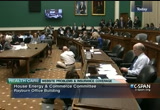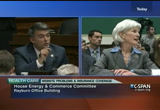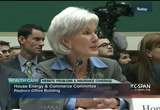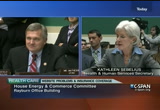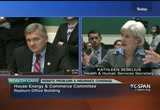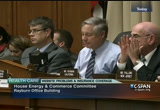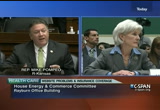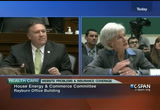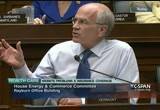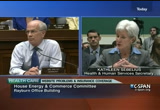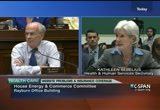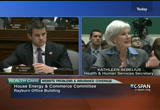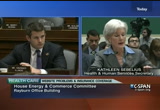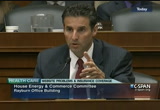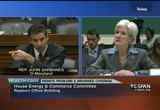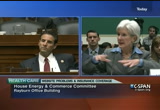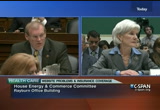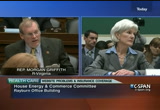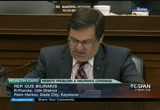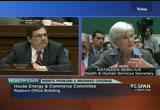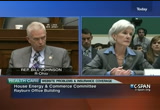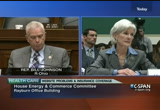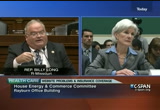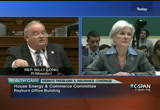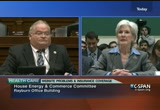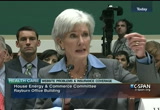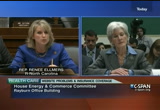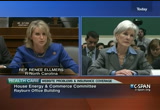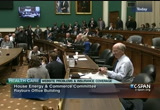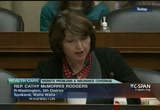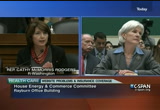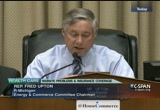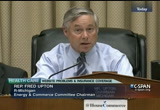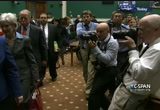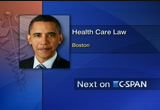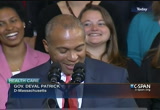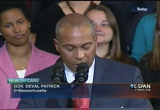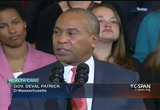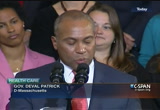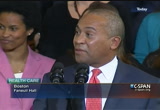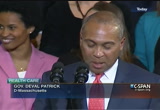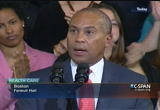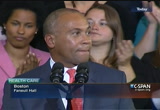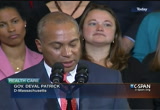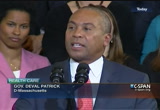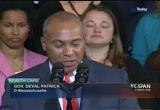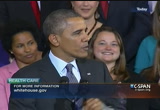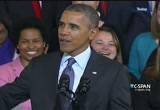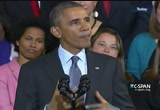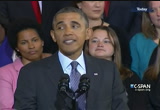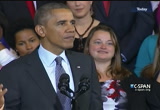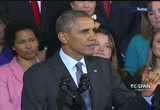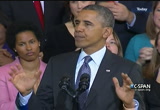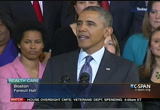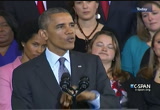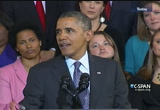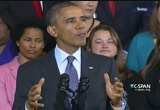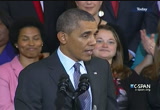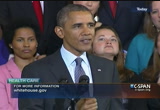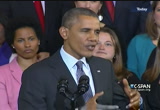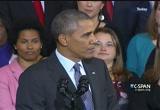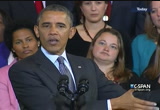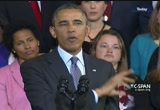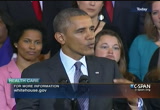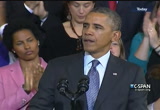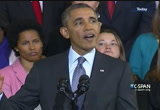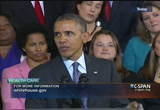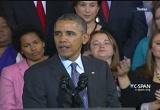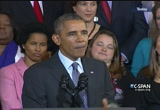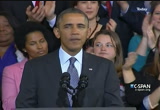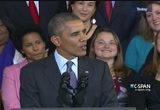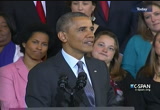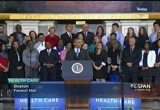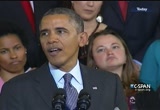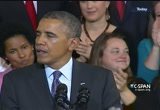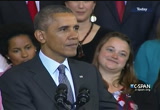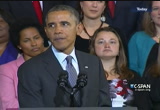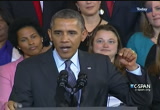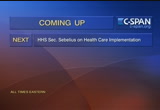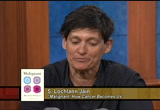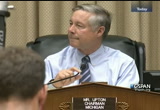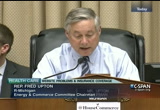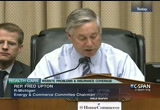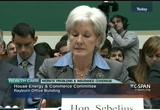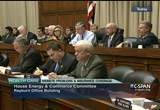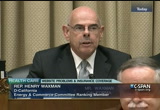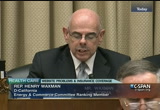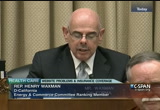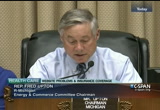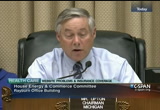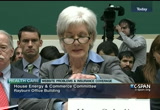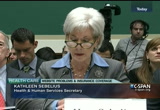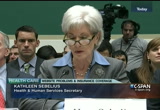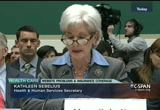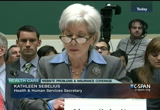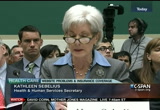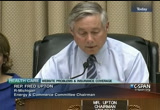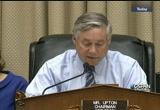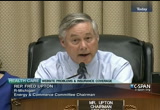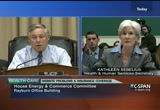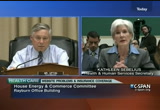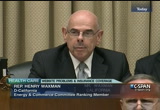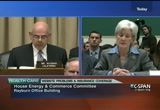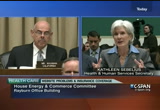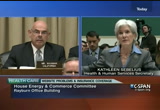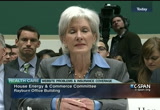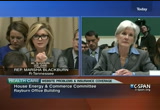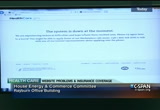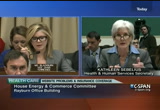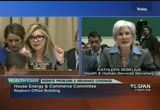tv Key Capitol Hill Hearings CSPAN October 30, 2013 11:00pm-1:01am EDT
11:00 pm
by how grateful people are to have new pathway to the doctor's office and the care they need. affordable options. the -- there are no longer being discriminated against because they had cancer. and diabetes or asthma. they are very grateful. they said, they said to me directly, it's like they found water in the desert. right now they are surprisingly -- they said it's taking time because people want to sort through all of these options. before they finally sign up at the end of the 26-week enrollment period. we must fix the marketplace to meet their expectations and we have high expectations for you and the administration. i think it's important to point out it's more than just a website. it -- despite the obstruction by republicans in my home state of florida, nationally, even going so far as to shut down the
11:01 pm
government, millions of americans are already benefitting and there are benefits that are not tied to healthcare.gov. some madam secretary, let's clarify what's working. is it correct to say many of the improvements that the aca makes to employer coverage and medicare were the vast majority of americans receive their coverage are not dependent on healthcare.gov. >> that's correct. >> so the delays and problems with healthcare.gov do not affect the millions of individuals thanks to the aca who no longer have to worry about lifetime monetary caps on their coverage that previously sent them to bankruptcy? >> that's absolutely true. i think the quote that the president was quoted recently saying if you have health care, you can -- you don't have to sign up for the new marketplace was referring to the large portion, the 95% of insured americans who plans are solid and stay in place and move forward.
11:02 pm
>> i understand the frustration with the website. i don't know why people are not similarly outraged by the lack of medicaid coverage in many of our states. do you find that hip critical? >> i think it's very troubling that millions of low income working americans will still have no affordable option if states don't take advantage of the expansion program leaving states bearing the cost of uncompensated care and families and workers not able to go to work and people still accessing care through emergency room doors. the most expensive, least effective kind of care they did g . >> mr. gardner? >> thank you for being here. here's my letter. this is the letter my family got canceling our insurance. we chose to have our own private policy back in colorado so we could be in the same boat as everyone of my constituents. and yet my insurance policy has been canceled.
11:03 pm
the white house website says if you like your health plan you have, you can keep it. did i hear it wrong? >> again, sir, i don't know how long you've had your policy -- >> why aren't you losing your insurance? >> pardon me. >> why aren't you losing your health insurance? >> because i'm part of the federal employees -- >> you're in charge of this law, correct, why aren't you in the exchange? >> because i'm part of the federal employee health benefit plan. >> why won't you go into the exchange? you're a part of this law, literally in charge of this law. should you be any different than the americans out there losing their health insurance? >> i'm part of the 95% with affordable eligible health care coverage. >> most americans aren't available to them. why will you not agree -- >> i'm not eligible for the exchange because i have coverage in -- >> you can decide to drop your coverage of your employer. you have the choice to decide not to choose -- >> that the not true, sir. >> members of congress are now
11:04 pm
part of the exchange thanks to an amendment that was added by congress but i'm not eligible. >> with all due respect. >> if i have affordable coverage in my workplace, i'm not eligible to go into the marketplace, that's part of the law. >> madam secretary, i would encourage you to be just like the american people and enter the exchange and agree to find a way -- >> it's illegal. i would like to show you an advertisement going on in colorado right now. this is an advertisement that a board member of the colorado exchange put forward, do you agree with this kind of advertising for obama care? >> i can't see it. >> it's a college student doing a keg stand. >> if the colorado exchange did that -- >> do you approve of this kind of advertising? >> i don't see it, don't know what it is and i did not approve it. this is a state based -- >> that's a pretty big picture of a keg and you can't see it? >> do i approve of it? >> you have athe built to opt out and you could take the
11:05 pm
insurance. >> if i have available employer based coverage -- >> i would like to submit a waiver from my district from obama care and hope you consider waiving it for the fourth congressional district. >> gentleman's time is expired. >> does your policy covered? >> mr. mathison. >> thank you, mr. chairman, madam secretary, thanks for your time. i want to ask on the issue of the fixes to healthcare.gov, we've had a lot of conversation about that today and talked about confidence levels for being ready by a certain time. i think one question that a lot of us have is, can you define what the magnitude of the problem is? is there a scale or metric by which we can understand how bad this is today and how we're going to get to where we go to have it fixed? >> well, again, sir, i've been informed that the problems are in -- the reports i've seen are really in two areas, they are in the performance area, which is
11:06 pm
speed and reliability. it's too slow and doesn't have reliable transfers and in functionality, there are parts of the system that don't make accurate transfers. so we have done an extensive assessment. they are prioritized. one of the priorities is the enrollment features which pass individual information to the companies where they want to enroll. that is not reliable at this point. the companies are not getting accurate data. so an example of the kind of thing we know we need to fix. >> is there a way to -- if you set up metrics figure out if we're making progress in terms of fixing those issues with speed and performance and functionality. >> with the team and jeff zienst at the head of it, there are comprehensive set of issues that will be measured and
11:07 pm
accelerated. >> do you have target dates along the way if you want to meet the november 30th time, assume it's functional of what you want, do you have target or metrics along the way to make sure you're on the path? >> my understanding is there are sort of groups of targets that fixes that can be loaded together. it isn't one at a time. they don't take days but they are try being to determine with a specific path, one of the charges that qssi has, really looking at the umbrella of what needs to be fixed, prioritizing them, figuring out what destabilizes if something else is fixed and how they can be grouped together. and that report will be in later next week. >> gentleman's time is expired. >> thank you. i would like to talk about kansas a little bit today. much like with some of my colleagues have made references to the wizard of oz, i don't
11:08 pm
think anybody not from kansas should do. they worked awfully hard to go down the yellow brick road. when they pulled back the curtain, they found there was nothing they didn't already have. and as we pull back the curtain, people are finding it's not exactly what they have worked so hard to find their way too as well. two stories, there's this commitment, if you like your plan you can keep it. i have a letter from mr. breeto in kansas, saw him in benton, he got the letter that says because your current plan does not offer the benefits standard qualified you'll be discontinued -- says good news, then there's a group of folks, pizza hut from kansas, franchisees, lots of folks have taken employees and families working there, gone from having full-time jobs to part-time jobs. they aren't able to keep the health care plan they had either and the one they wanted. what do you tell -- why were the
11:09 pm
plans these folks had good enough when you were the insurance commissioner in kansas and when you were kansas' governor but the plans today aren't good enough for those hard working kansas families? >> sir, i would tell you in the roles i had the honor of serving in in kansas, i worked every day to try to eliminate the discriminatory features of the insurance industry that finally with the affordable care act are gone. my successor and elected insurance republican commissioner sandy kraeger and i worked on a whole series of plans to expand coverage. i did work on these issues and we were not necessary -- >> you say these were lousy plans and miss tavenner said no true insurance. do you think the plans weren't true insurance? >> in the individual market, the insurance commissioner in kansas and virtually every place in the country -- >> it's a yes --
11:10 pm
>> it's a yes or no question. were they true insurance plans? >> a lot of them are not true insurance plans, no. >> i yield back. >> gentleman from vermont. >> i'm going to summarize what i've been hearing. number one, the website must be fixed. you've been very forthright and you're going to fix it. number two, we've had a real battle about health care, had a battle in this congress. it was passed and the president signed it and the supreme court affirmed it, a brutal battle. there was an election people where the american people affirmed it and then the shut down in the threat of deabt default. all of us represent people who are going to win or lose depending on how effectively this is rolled out. there's significant question about existing insurance policies what the president said and so on. let's acknowledge something. a lot of insurance companies were ripping off innocent
11:11 pm
american people by promising them insurance until they got sick and then it got canceled because they had a preexisting condition that wasn't disclosed. that's got to end. the challenge for us going forward is to make health care affordable. madam secretary, my question is, is there any indication that there's been a slowing of premium increases as a result of the affordable care act because, unless we can keep those premium increases down, they can't rise faster than the rate of inflation, all of us are going to lose. >> i would say the trends in the private market over the last three and a half years are that cost increases have slowed down. are rising at a lower rate than the decades before. in fact, in this individual market, the old individual market, the typical increase was 16% year in and year out rate
11:12 pm
increase. often that came with additional medical underwriting. it gives a sense of how the costs were. we know that medicare costs are down and medicaid costs had a decrease per capita last year, not an increase per capita and underlying health care costs are down. these rates in the new marketplace have come in about 16% lower on average than was projected. not by us by by the congressional budget office. and we know that in many of these markets, they are much more competitive. i believe in market competitiveness. that drives down rates. the states where the most companies are participating, have the lowest rates. and new companies have come in, significantly below the old monopoly companies that dominated this individual marketplace. we're on a pathway. are we there? no. affordable coverage at the end of the day for everybody is the goal. >> i yield back. thank you, madam secretary. >> i'm trying to make sure
11:13 pm
you're out of here by 12:30 before we start the second round of questions. >> mr. kissinger. >> that was a joke, right? >> i see sheer panic. >> thank you for being here. you stated earlier to mr. har better, you give the president regular updates and the president said he knew nothing about the status and functionality of the marketplace. how often and what were the subject of those updates? >> i think there were a series of regular meetings with the president with some of our federal partners with offices of the white house from the omb to others on a monthly basis, giving reports on policy and where we were going, none of those i would say involve detailed operational discussions. that wasn't the level. it was are we coming together? do we have companies and plans. >> i understand that. obviously when it comes to the
11:14 pm
president of the united states, certain level of details you have to see kind of 10,000, 20,000 foot overview. in terms of functionality, he was legitimately caught off guard on -- >> i assured him and -- that we were ready to go. everyone knew with the big plan that there were likely to be problems. no one anticipated this level of problems. >> just a quick question. where is hhs getting the money to pay for fixes? is it coming from other hhs accounts? have you used your transfer authority to move money from nonaca programs to pay for the cost of implementing the president's health care program? if so, from which have you drawn money to help with the fix that's not aca related? >> as you know, congressman, it's been two years since we've had a budget at hhs. we also have not had at the president's requested implementation budget,
11:15 pm
authorized by the congress, each of those years we have used not only resources internally but i do have legal transfer authority that i've used and a nonrecurring expense fund. we'll get you the details of that. >> the answer is yes, there are non-aca money being used for the implementation -- >> there is money that is specifically designed for either outreach and education, so health centers hired education and outreach people as part of their outreach for health personnel. i would say it's definitely related cause to get expanded health care. >> thank you, mr. chairman. >> thank you, mr. chairman, thank you madam secretary for being here. my understanding is that a lot of the companies insurers that have been offering plans in the individual market, the ones sending out these notices, are actually repositioning
11:16 pm
themselves in the health insurance exchange to offer alternative plans. is that -- >> yes. >> and in addition to those insurers who have been in the individual market, you have a lot of other companies and insurers providing plans in health insurance market? >> that is true. >> so the way i look at this. i went to buy oriole tickets when the season was underway. they closed the window. i didn't have to go home because they opened another window a few feet away. so essentially what's happening is people are coming up on the renewal period and getting up to the window, the individual market and being told that window is closed but if you go right down the line here there's another window that's open. by the way, when you get there, you'll get better coverage, potentially at reduced premiums. if you go down to window 3, these subsidies that may also be
11:17 pm
available to you. this notion that people are being turned away from an affordable product, that provides good quality care, is prepostero preposterous, they are being steered to a place where they can get good quality coverage, in many instances much better than the coverage that they had before, at an affordable rate that is supported by the subsidies that can be available to many, many people. this is what is so promising about the affordable care act. so i think it's important for people to understand that that window is not being shut. they are being steered someplace elsewhere they can get a good opportunity. >> i think the first option for those companies is to say we'd like to keep you here and here are the plans we're offering. but to be fair, customers will now have an opportunity to look across a landscape, which they couldn't before.
11:18 pm
they will have entry into those other windows, which many of them didn't have before with a preexisting condition. as you say, 50% of the market will have financial help in purchasing health insurance which none of them had before. >> gentleman's time expired. mr. griffith. >> earlier in your testimony here today you said a couple of times, plans we enjoy but then as you noticed with mr. gardner's eloquent testimony, we're not going to be in the same plan you're in. i was one of those that thought it was a good idea as part of a proposal floating around the halls here in congress, that the president and cabinet secretaries ought to also be in the marketplace and not have a special federal plan that is you will have after january 1 and we will not. the president while that was being discussed issued a veto threat. did you discuss the veto threat with the president before he made it and have you discussed it with him since then? >> no. >> and then i will ask you relating back to the contractors
11:19 pm
involved in this. cgi told us that the spanish website was ready to go. that they thought everything was ready just as they did with the regular site. that didn't prove out. but that they were told not to implement it. likewise the shop and browse section was ready to go. do you think they were misleading this committee when they made comments? >> i think what they believed is that that product independent of the entire operational site was ready and tested. what a determination was made -- i was involved with the spanish website and medicaid transfers to say let's minimize the risk for the whole site -- >> that raises the next question up, because one of the other contractors qssi, i believe, indicated that part of the problem because once you took away the opportunity to browse, every had to set up an account and cms stopped one of the
11:20 pm
browsing options as well and that contributed to the log jam and contributed to the problems. isn't it -- is he correct on that, that not allowing people to look without having to sign up, wouldn't that have made it easier for the american people? >> in hindsight, that probably would have been advantageous, i can tell you the decision made going forward was to minimize risk, that didn't work so well. adding additional features that didn't involve people wanting to get to what they would independently pay and what they would qualify for and what the plans were seemed to be things that could be added down the road. it was wrong. >> gentleman's time is expired. >> i appreciate it very much, mr. chairman and thank you, madam secretary, for testifying today. over the week in "the new york times" wrote the following, project managers at the department of health and human services assure the white house that any remaining problems could be worked out once the website went live. other senior officials predict a
11:21 pm
serious trouble and advise delaying the rollout. can you confirm this is true? did any senior official predict serious problems and did any senior department officials advise delaying the rollout of the exchanges or parts of the exchanges on october 1st? >> i can tell you that no senior official reporting to me ever advised me that we should delay. you heard from the contractors on the 24th that none of them advised a delay. we have testing that did not advise a delay. so not to my knowledge. >> did they indicate to you there were serious problems? >> they indicated to me we would always have risk because this system is brand-new and no one has operated the system like this before to any degree. so we always knew there would be the possibility that some things would go wrong. no one indicated this could possibly go this wrong. >> can you name some of the officials that gave you the
11:22 pm
advice, that there were serious problems? >> again, we had series of meetings with teams from cms. i was always advised that there is always a risk with a new product and new site. but never suggested that we delay the launch of october 1st, nor did our contracting partners ever suggest that to us. >> thank you, madam secretary. >> thank you, mr. chairman, yield back. >> mr. johnson. >> madam secretary, thank you for being with us here today. cms was the integrating prior to the rollout, correct? >> that's correct. >> you testified you hired an outside company to serve -- >> one of the contractors -- >> who is is that? >> qssi, who built the hub. >> the same company that told our committee last week they were not only the developer of the hub and pipe line but also an independent tester of the system. >> you've acknowledged in your testimony today that inadequate testing played a significant
11:23 pm
role in this failed launch, aren't you concerned qssi has lost its ability to be an objective independent arbitrator in addressing the problems that plague the system now? they are part of the tester and part of the developer and part of the problem. >> i haven't lost confidence in them. the testing they did is valid ating the pieces of the equipment, what we said, since the launch is we did not do adequate end to end testing, that was not the qssi responsibility. >> in this new roll as integrater, are are you going to be paying them more than they were paid under the original contract? i would expect -- >> that discussion is under way in terms of what the role will entail and outlines are, yes,sir. >> hard working american taxpayers have already paid for this implementation once. do you think it's fair to ask taxpayers to pay more so qssi can attempt to do something that administrator tavenner and her
11:24 pm
team were unable to do right the first time. >> the american taxpayers expect us to get the site up and running. >> any expected it the first time. >> i understand and so did i. we have not expended the funds that have been encumbered forred contracts. we'll monitor every dime we spend and reaudit things that are going forward. >> with that, mr. chairman, i yield back. >> gentleman yields back. mr. long. >> thank you, mr. chairman and mr. secretary for being here today. given your testimony, earlier today you said that i'm responsible for the implementation of the affordable care act. i've heard you referred to and maybe yourself as the point person for the rollout, the architect of implementing affordable care act. so you are kind of the president's point person, are you not, for this rollout? >> yes, sir.
11:25 pm
>> i earlier you were asked -- there's a lot of things striking about the rollout of this and about affordable care act all together, but the thing most striking to me, is when we had the point person for the rollout here, and you're not going into the exchange. i've heard you say, that -- and you got advice from the foekds behind you, but i'm asking you today, can you tell the american public if your advisers behind you, if they happen to have given you wrong information, if it is possible for you to go into the exchange, like all of these millions of americans going into the exchanges, will you admit to forego your insurance plan you're on now and join us in the pool. water is fine. all of the congressman and staff have to go into the exchanges. we have to go into the d.c. exchanges. i will say i tried to get on the website. was successful during the hearing earlier and got to the d.c. exchange where i have to
11:26 pm
buy from. i got part way through and when i got to part to enter my social security, i could not bring myself people to do that when i heard from folks about the security. if your advisers are wrong and it is possible for you -- i'm not saying it is, if it's possible for you to forgo your government plan, will you tell the american public, i'll go into the exchanges next year like everyone else? >> the way the law is written -- >> it's a yes or no. >> let's say you're wrong on that. if you're wrong -- >> i don't want to give misinformation to the american public -- >> what? >> i don't want to give misinformation who have affordable coverage -- >> women you go into the exchanges? >> if you can, will you? that's a yes or no. >> i will take a look at it. i don't have any -- >> that's not a yes or no. >> gentleman's time is expired. >> you're the architect of the whole program and you won't go into it -- >> i did say not say it.
11:27 pm
it's illegal. >> if it's not illegal -- >> will you go in? >> affordable coverage -- >> the water is fine. >> gentleman's time is expired. >> i have a unanimous consent request, i'd like madam secretary, i'd like you to answer for the record if you were able to do what the gentleman just suggested or follow the recommendation of cory gardner, our colleague from colorado and went into the -- to buy an individual policy, would you be able to find one that would protect you from cheap shots or do you think it has to be mandated for coverage? i leave it -- the record open for your response. >> we'll wait for that response to come back. >> gladly go in the exchange if i didn't have affordable coverage in my workplace. i would gladly join it. and the d.c. market is an independent state based market even though d.c. is not a state. we do not run the d.c. market in
11:28 pm
the federal marketplace. >> gentlelady from north carolina, miss elmerz. >> i have a couple of questions, thank you for being with us today, madam secretary. i would like to go to the issue raised by my colleagues here about accurate information. number one, i've heard the issue of medicaid part d brought up, many, many times, although my colleagues all voted no against it initially, now they are stoeing the virtues of medicare part d. is it a mandate or is it voluntary? >> it is a voluntary program. that's the first piece of accurate information i would like to get. we're asking or we're actually forcing millions of americans to go to find a health care premium in some way, whether it's to go to the exchange or whether they are to be insured, many of my constituents are being -- are reaching out to me those with individual policies and they are
11:29 pm
saying to me that my rates are going up 400%, my rates are going up 127%, these are my constituents. now, we're talking about open enrollment, but it's forcing the issue, is it not, that if an american does not have health care coverage, they are essentially breaking the law? is that not correct? >> if someone can afford coverage and has that option and chooses not to buy coverage, they will pay a fee on their -- >> and it is a law so there are they are -- >> you also brought up the issue quh you were in kansas that you fought against discriminatory issues. as far as the essential health benefits, correct me if i'm wrong, do men not have to buy maternim maternity coverage? >> policies will cover maternity
11:30 pm
coverage for young and healthy. >> including men. >> under 30-year-olds will have a choice also of a catastrophic plan which has no maternity coverage? >> catastrophic. but the men are required to purchase -- >> an insurance policy has a series of benefits, whether you use them or not. one of the benefits -- >> that's why the health care premiums are increasing, we're forcing them to buy things they will never need. thank you, madam chairman. >> the individual policies cover families, men offer ten do need maternity coverage for their spouses and for their families, yes. >> single male age 32 does not need maternity coverage to the best of your knowledge has a man ever delivered a baby? >> gentlelady's time -- >> i don't think so. >> -- has expired. gentlelady, cathy morris rogers. >> thank you, mr. chairman. although we were told repeatedly
11:31 pm
that if you liked your health insurance plan you would be able to keep it, we're now being told by the government that they have determined many existing plans to be lousy, subpar. in reality, this law is becoming quickly less about helping americans purchase affordable coverage and more about compelling millions of americans into a struggling medicaid program. in my home state of washington, 90% of enroll ees will be in medicaid. 16,000 of them coming into a program they were already eligible for. colorado, 89%, kentucky, two thirds, maryland, 97%. this is -- these are states already struggling with budgets, wondering how they are going to cover medicaid, which is as we all know for the most vulnerable population. isn't it true, that in states like washington, they are going to have new unexpected costs associated with a dramatic
11:32 pm
influx into medicaid? >> congresswoman, the medicaid expansion provision of the affordable care act is -- >> are states going to face new costs? >> federal government pays 100% of the cost of newly insured for the first three years -- >> these are existing -- people already eligible and we know that two out of three doctors don't accept new medicaid patients and we know current provider rates are going to drop at the end of 2014. isn't it true existing medicaid enroll lees will further compete for scarce resources in these states? >> if the citizens of washington who are signing up are eligible for medicaid, they certainly will be enroll in medicaid now -- >> i'm concerned that the most vulnerable in this country are going to lack access to the care they think they are going to receive. >> i think that's absolutely
11:33 pm
true. in states choosing not to expand medicaid, it's particularly dire -- >> it's existing medicaid. >> finally, i wanted to inform the secretary, you told us several hours ago when the hearing started that the website was down. if you look at the screen, several hours later, healthcare.gov is still down. you promised the system would be ready on october 1st. you're clearly wrong. so before i leave you today, i would impress upon you this is more than a broken website. this is a broken law, millions of americans are getting notices their plans are being canceled. >> gentlelady's time is expired. i just -- i would do a couple of things here. first, i'm going to ask unanimous consent that the written opening statements for any member on the committee be interest dugsed into the record and without objection, the documents will be there. consent to put the document binder and other documents
11:34 pm
presented to the secretary during questioning into the record without objection. so ordered. let me say in conclusion, we do look forward to having you back in december to get an update on where we are. we'll work with your schedule to find a right time and date early that week. i want you to know we're going to want real numbers. you'll have them by then, is that right, in terms of signup? >> we'll have them by mid november. >> we look forward to getting those done. we appreciate -- we really do appreciate your time this morning to take questions and i apologize to all of members who we had to shorten the time but those things happen when you have this much interest. we look forward to continuing to get an update and look for your continued work. >> mr. chairman, from our side of the aisle, we want to work with you.
11:35 pm
11:36 pm
up on c-span, president obama has a talk about problems implementing the health law. later, the first public hearing of the 2014 budget negotiators in the house and senate. on the next "washington journal," mother jones magazine and first, washington bureau chief david corn talks about the founding and mission. then discussing a recent study that shows a decline in the financial safety net of the poorest families with children this years campaign.
11:37 pm
later, lauryn williams and on women's issues. washington journal is alive every morning starting at 7:00 a.m. eastern on c-span. on september 16, aaron alexis people at the washington navy yard. they examine the shooting and security at federal facilities. you can see it live starting at 10:00 a.m. eastern on c-span. >> john foster had recently died when the super airport was being built and president eisenhower immediately announced that it beld be announced -- would named dulles airport. he did not want to name it after a cold war warrior but finally
11:38 pm
the decision was made to name it after dulles. you can see the film clip of kennedy opening the airport with eisenhower and allen dulles there and he pulls back a curtain. ofind is this giant bust dulles and it stands there so i went to see it while that was writing the book and i could not find it. i started to ask where the big bust was and nobody had even heard of it. it was a long process and finally thanks to the washington airport authority i was able to discover that the bust had been taken away from its place in the middle of the airport and it is now in a closed conference room baggage claim number three and i find this a wonderful metaphor for the at one timeers who had exercised earth shattering power and were able to make and break brothers have now been
11:39 pm
effectively forgotten and airbrushed out of our history. >> the dulles brothers led overt and covert operations for a good heart of the cold war. the ramifications can still be felt some 60 years later with kinzer, sunday night at 8:00 on c-span's "q and a." >> news reports say that thousands of americans are due to lose their current health care plans because they failed to include essential benefits required by the law. this is more about the president's quote that if you can the plan you had you keep it. the president's about 45 minutes. >> ladies and gentlemen, please welcome massachusetts governor deval patrick. [cheers and applause]
11:40 pm
how are you? good afternoon, everybody. how is the red sox nation this afternoon? [cheers and applause] >> ladies and gentlemen, brothers and sisters, fellow citizens, i have the high honor of introducing to you the president of the united states. [cheers and applause] but, of course, you folks already know him. [laughter] >> so, as the president is standing just off stage, i want to take my time here at the podium - [laughter] >> to introduce all of you to him. in this storied hall today, mr. president, are the architects and advocates for health care
11:41 pm
reform in massachusetts. [cheers and applause] i and this gathering right here you and this gathering right here brought in is the broad by an coalition, providers, payers, patients, consumers, you will you policy makers, academics, business and labor and from both political parties will little more and more know all or no party at all, who came and together to invent health procure warm you care reform in and importantly the massachusetts and then together massachusetts and then refine it and we will will importantly stuck together to refine it as we move forward. we you are the leaders who when will and you will not we learned a hard lesson or hit a wall, the goal is in value stuck with that health care is a link it and with each other.
11:42 pm
in a a because of the shared value that health care is a public good and that every will will citizen deserves a will access to quality affordable care. give you my economic affordable care. [cheers and applause] >> quality, affordable care increases productivity and all accessible to all improves lives employers alike and in many to create job cases, saves and you and cases, saves lives. you are you and we are it gives peace of mind and economic security to working families. an wife and him security to working families. him it increases productivity him and agree for large and reasonable measures to you in a you small employers alike. or it creates jobs and us it creates jobs and here in the commonwealth medicine at him contributes to the strength of him him we know that we know and you the massachusetts economy.
11:43 pm
it is a powerful statement of who we are as a commonwealth. and by every - [applause] >> by every reasonable measure, it has been a success for us we here in the commonwealth of massachusetts. you [cheers and applause] then you >> how do we know? and help >> how do we know? how do we know? him him virtually every resident in wall all on the holes in your old old as he is overall you in as the commonwealth is insured though and only about today. more private companies -- move youmore private companies -- move private companies offer insurance to their employees anything than ever before. collectively are over 90% of our premium residents have a primary are finally using a care physician. reinvigorated re-freezing over the physician. edge of preventive care is up a few years ago preventive care is up increases every and health hims than who you disparities
11:44 pm
at are down. most important of all i resident and a little more most important of all on we are healthier both physically and mentally. expansion itself has added only about 1% of state spending to our budget. and while premium base rates were increasing over 16% a few years ago. today, increases average less than 2%. and in the truth is, policy only of will in every walk ofre it life touches people. i know this policy matters you who were ini know this policy matters because i have met people all across the gobbled them reviewed met people all across the laura grew commonwealth in every walk of new york life whose lives have been improved or saved because of the care our reforms made a possible rising of the care our reforms made: you possible. amazing and you a couple of them made a weird and you are here today. who are you laura, where are are burden of eac you?
11:45 pm
there you are. want to wake himthere you are. owns her own hair salon and responsible for providing health insurance to her family of five including her son mason. he has a rare genetic condition. laura is able to afford his you medicine because they found thank you for being coverage in through our connector, our connected to diagnose through our connector, our version of the a.c.a. marketplace. this policy matters. where are you, david? there you are. thank you for being here. soon after coverage through the connector, david was diagnosed with hodgkins lymphoma. he is back to his old life and swimming for exercise. god bless you, david. [applause] >> brian left his law firm job to become an entrepreneur in massachusetts. brian, where are you? because he was able to access quality insurance directly through the connector, he is chasing his entrepreneurial dream and on his way of becoming a creator of jobs for others
11:46 pm
without being exposed to a health emergency along the way. good luck to you. [applause] >> hundreds of thousands of massachusetts people don't fear going bankrupt from medical bills or being thrown off their insurance if they get really sick or being declared ineligible for insurance because they were seriously ill sometime in the past. if policy matters where it touches people, mr. president, this proud policy means a lot. health care reform is working for the people of massachusetts. and it will work for the people of america. [cheers and applause] >> my republican predecessors
11:47 pm
signed the legislation to expand health care reform in massachusetts right here in this room on this very stage. chief legislative partner was the democratic state senator who was here then and here today. where are you? thank you. [applause] >> so was our beloved ted kennedy. so were many of the members of the coalition who are here again today. and they have worked right along side my team and me these last seven years to refine and improve the means while staying true to the end. i am proud of what we and they have accomplished, and i think they are proud, too. and ought to be. [applause]
11:48 pm
>> but our launch seven years ago was not flawless. we asked an i.t. staffer who has been with us since the beginning, and this is what he said, and i'm quoting. we didn't have a complicated eligibility problem then. we had issues with data mapping. our provider searches were not good and the web site was a constant work in progress over the first few years, but other than that, it was smooth. [laughter] >> does that sound familiar, mr. president? we started out with a web site that needed work, we had a lot of people with reasonable questions and not a good enough way to get them the answer, but people were patient. we had good leadership and that
11:49 pm
same coalition stuck with it and with us to work through the fixes, text surge and all. why? why? because health reform in massachusetts, like the affordable care act, is not a web site. it's a values statement. [cheers and applause] >> it's about insuring people against a medical catastrophe. it's about being our brothers and our sisters' keeper by helping others help themselves. the web site glitches are inconvenient and annoying. they must be fixed and i'm confident they will be. but i hope you know, mr. president, that the same folks who pretend to be outraged about the web site not working didn't want the a.c.a. to work in the first place. [applause] >> the urgency of fixing what's not working is, as we all know,
11:50 pm
about the american people who need simple, reliable and convenient access to information about coverage, not about silencing critics who will never be silent. you and the congress looked to massachusetts as a model for how to eninsure working people and how to lead better, more productive lives. as you turn to the vital work of making that federal i.t. system work, we also want to be a model for how to keep your eye on the prize and how working together, you put people first. the people here all in this coalition totally get that. so, mr. president, welcome to the capital of red sox nation! [cheers and applause]
11:51 pm
and welcome also to the future of affordable, acceptable health care for everybody. ladies and gentlemen, the president of the united states! [cheers and applause] chief"] ♪ the [cheers and applause] >> hello, boston! it's good to be back in boston! [cheers and applause] >> good to be back in boston because one of america's best governor introduced me, deval patrick! [cheers and applause]
11:52 pm
>> good to see congressman bill keating here. give bill a big round of applause. [applause] >> i want to praise somebody who is not here -- i just left him, but he wears his heart on his sleeve. he loves this city so much and it shows in what he has been doing for years now, one of america's best mayors, the mayor of boston. >> and good to see all of you. i was just at the airport, deval met me along with the mayor and the mayor went back to work so he could wrap up in time for the first pitch. [laughter]
11:53 pm
>> i'm well aware that a presidential visit is not the biggest thing going on today in boston. i tried to grow a beard, but michelle wasn't having it. i was old enough to remember a time when the red sox were not in the world series three times in 10 years, but i know the chance to win won at home for the first time since 1918 is a pretty special thing. [cheers and applause] >> so i promise, we will be done here in time for everybody to head over to fenway and see big papi blast another homer. [cheers and applause] >> the reason i'm here, though, is because this is the hall
11:54 pm
where seven years ago, democrats and republicans came together to make health reform a reality for the people of massachusetts. it's where then governor mitt romney, democratic legislators, senator ted kennedy, many of the folks who are here today joined forces to connect the progressive vision of health care for all with some ideas about markets and competition that had long been championed by conservatives. and as deval just said, it worked. it worked.
11:55 pm
11:56 pm
rally back in the summer. [laughter] >> this is the health care rally. [cheers and applause] >> health care reform in this state was a success. that doesn't mean it was perfect right away. there were early problems to solve. there were changes that had to be made. anybody here who is involved in it can tell you that. as deval just said, enrollment was extremely slow. within a month, only about 100 people had signed up. 100. but then 2,000 had signed up. and then a few more thousand after that.
11:57 pm
and by the end of the year, 36,000 people had signed up. and the community all came together. you even had the red sox help enlist people to help them get them covered. and pretty soon the number of young uninsured people had plummeted. when recession struck, the financial security of health care sheltered families from deeper hardship. and today, there is nearly universal coverage in massachusetts. and the vast majority of their citizens are happy with their coverage. [cheers and applause] >> and by the way, all the parade of horribles, the worst predictions about health care reform in massachusetts never came through. they are the same arguments that
11:58 pm
you are hearing now. businesses didn't stop covering workers. the share of employers who offered insurance increased. people didn't get left behind. racial disparities decreased. care didn't become unaffordable. costs tracked what was happening in other places that wasn't covering everybody. now, mitt romney and i ran a long and spirited campaign against one another, but i always believed that when he was governor here in massachusetts, he did the right thing on health care. and then deval did the right thing by picking up the torch and worked to make the law work even better. and it's because you guys had a proven model that we built the affordable care act on this template of proven bipartisan success, your law was the model for the nation's law. [cheers and applause]
11:59 pm
>> so let's look what's happened. today, the affordable care act requires insurance companies to abide by some of the strongest consumer protections this country has ever known, a true patients' bill of rights. [applause] >> no more discriminating against kids with pre-existing conditions. [cheers and applause] >> no more dropping your policy when you get sick and need it most. [cheers and applause] >> no more lifetime limits or restricted annual limits. [cheers and applause] >> most plans have to cover free preventive care like mammograms and birth control.
12:00 am
>> young people can stay on their parents' plans until they turn 26. all of is in place right now, it is working right now. [cheers and applause] >> now, the last element of this began on october 1, when the affordable care act created a new marketplace for quality, private insurance plans for the 15% or so of americans who don't have health care and 5% of americans who have to buy it on their own and not part of a group, which means they don't get as good a deal. and this new marketplace was built on the massachusetts model. it allows these americans who have been locked out to get a better deal from insurers. they are pooling their purchasing power as one big group and insuresers want their business, which means they give
12:01 am
them a better deal, and they compete for that business. and as a result, insurers in the marketplace, they can't use your medical history to charge you more. if you have been sick, you finally have the same chance to buy quality affordable health care as everybody else. a lot of people will qualify for new tax credits under this law that will bring down costs even further. so that if you lose your job or you start a new business or you are self-employed and you are a young person looking at several jobs until you find one that sticks, you can stay insured, insurance that goes with you and gives you freedom, without fear of accidents or illness will derail your dreams. this marketplace is open now. insurance companies are competing for that business. the deal is good. the prices are low.
12:02 am
but let's face it, we have had a problem. the web site hasn't worked the way it's supposed to over the last couple of weeks. and as a consequence, people haven't had a chance to see how good the prices for quality, affordable health insurance through these marketplaces really are. ultimately this web site, healthcare.gov will be the easiest way to shop and buy these plans because you can compare prices and see what kind of coverage it provides. but, look, there's no denying it, right now, the web site is too slow, too many people have gotten stuck and i'm not happy about it. and neither are a lot of americans who need health care and they are trying to figure out how they can sign up as quickly as possible. so there's no excuse for it.
12:03 am
and i take full responsibility for making sure it gets fixed asap and are working overtime to improve it every day, every day. [cheers and applause] >> and more people are successfully buying these new plans online than they were a couple of weeks ago. i expect more people will be able to buy conveniently online every single day as we move forward. we are going to get these problems resolved. now, in the meantime, you can still apply for coverage over the phone or by mail or in person, because those plans are waiting. and you are still able to get the kind of reliable, affordable health insurance that has been out of reach for too many people for too long. i am old enough to remember when there was not such a thing as a web site.
12:04 am
\[laughter] >> i know that's shocking to people. but the point is i'm confident these marketplaces will work because massachusetts has shown that the model works and we know what's being offered by these insurers. [applause] we know it's going to work. and so far choice and competition in the new national marketplaces have helped keep costs lower than we even projected. in fact nearly half of all single uninsured 18-24 year olds may be able to buy insurance for 50 bucks a month or less, less than your cell phone bill, less than your cable bill. [applause] and one study shows that nearly 6-10 uninsured americans may
12:05 am
find coverage for 100 bucks or less even if they are older than 34. if every governor was working as hard as deval or governor o'malley in maryland or governor cuomo in new york, about 8-10 americans would be getting health insurance for less than 100 bucks a month. [applause] and by the way, it's not just in massachusetts. look at kentucky. the governor, who is a democrat, is like a man possessed with helping more people get coverage. he thinks it's the right thing to do. keep in mind, i did not win in kentucky. [applause] but there are a lot of uninsured
12:06 am
people in kentucky, and they are signing up. oregon has covered 10% of its uninsured citizens already because of the affordable care act. 10% of the uninsured have already gotten coverage. [cheers and applause] >> arkansas, i didn't win that state either, covered almost 14% of its uninsured already. that's already happened. [applause] and you got some republican governors like governor kasich of ohio who put politics aside and expanding medicaid through this law to cover millions of people. unfortunately, there are others who are so locked into the politics of this thing that they won't lift a finger to help their own people and leaving millions of americans uninsured unnecessarily. that's a shame.
12:07 am
because if they put as much energy into making this law work as they do in attacking the law, americans would be better off. americans would be better off. [cheers and applause] >> so that's the affordable care act, better protections for americans with insurance. a new marketplace for americans without insurance. new tax credits. more choice. more competition. real health care security, not just for the uninsured or underinsured but for all of us because we pay more in premium and taxes when americans without good insurance visit the emergency room. [applause] >> and since we all benefit, there are parts of this law that also require everybody to
12:08 am
contribute. require everybody to take some measure of responsibility. so to help pay for the law, the wealthiest americans, families who make more than $250,000 a year have got to pay a little bit more. the most expensive employer health insurance, don't qualify for tax credits, some people aren't happy but it's the right thing to do. in massachusetts, most people who can afford health insurance have to take responsibility to buy health insurance or pay a penalty. employers with more than 50 employees have to provide health insurance to their workers or pay a penalty because they shouldn't dump off that cost to others. everyone has responsibilities. now, it is also true that some americans who have health insurance plans that they bought
12:09 am
on their own through the old individual market are getting notice from their insurance companies suggesting that somehow because the affordable care act, they may be using their existing health insurance plans. this is the latest flurry because there has been confusion and misinformation, i want to explain just what's going on. one of the things health reform was designed to do was to help not only the uninsured but also the underinsured. and there are a number of americans, fewer than 5% of americans who got cut-rate plans that don't offer real financial protection in the event of a serious illness or an accident. remember, before the affordable care act, these bad apple insurers had free rein to limit the care that you received or use minor pre-existing conditions to jack up your premiums or bill you into bankruptcy. so a lot of people thought they
12:10 am
were buying coverage and turned out it wasn't so good. before the affordable care act, the worst of these plans routinely dropped thousands of americans every single year. and on average, premiums for folks who stayed in their plans for more than a year shot up to 15% a year. this wasn't just bad for those folks who had these policies, it was bad for all of us, because, again, when tragedy strikes and folks can't pay their medical bills, everyone else picks up the tab. now, if you had one of these substandard plans before the affordable care act became law and you really liked that plan, you are able to keep it. that's what i said when i was running for office. that was part of the promise we made. but ever since the law was passed, if insurers decided to downgrade or cancel these
12:11 am
substandard plans, what we said under the law is, you have to replace them with quality comprehensive coverage because that, too, was and central preliminary cyst of the affordable care act from the very beginning. and today, that promise means that every plan includes maternity care, preventive care, and hospitalization and can't use pregnancy or a sports injury or the fact that you are a woman to charge you more. [cheers and applause] >> they can't do that anymore. if you couldn't afford coverage because your child had asthma, he's not covered. if you are one of the 45 million americans with a mental illness, you're not covered. if you are expecting a baby, you
12:12 am
are covered. the system is more secure for you and more secure for everybody. so if you are getting one of the these letters, just shop around in the new marketplace, that's what it's for. because of the tax credits we are offering and because of the competition -- pipeline -- because of the tax credits we are offering and the competition between insurers, most people are going to be able to get better comprehensive health care plan for the same price or even cheaper than projected. you are going to get a better deal. now there is a fact that americans with higher incomes will pay more and protections like the patients' bill of rights and that will actually save them from financial ruin if they get sick, but nobody is losing their right to health
12:13 am
care coverage. and no insurance company will be able to deny you coverage or drop you as a customer. those days are over. and that's the truth. and that is the truth. [cheers and applause] >> for people without health insurance, they are finally going to be able to get it. for the vast majority of people who have health insurance that works, you can keep it. for the fewer than 5% of americans who buy insurance on your own, you will be getting a better deal. so anyone peddling the notion
12:14 am
that insurers are cancelling peoples' plans without mentioning that almost the insurers are encouraging people to get better coverage with stronger benefits and stronger protections and others will get better plans through new carriers and make the plans cheaper, if you leave that stuff out, you are being grossly misleading, to say the least. \[applause] >> but frankly, look, you saw this in massachusetts. this is one of the challenges of health care reform. health care is complicated and very personal and it's easy to scare folks. and it's no surprise that some of the same folks trying to scare people now are the same folks who have been trying to scare folks about the affordable care act from the beginning. and frankly, i don't understand it. providing prosecute people with health care, that should be a no-brainer. giving people a chance to get
12:15 am
health care should be a no- brainer. [applause] >> and i have said before, folks actually had good ideas, better ideas, then what is happening in massachusetts or what we've proposed for providing people with health insurance, i would be happy to listen, but that's not what's happening. and anyone defending the remnants of the old broken system as if it was working for people, anybody who thinks we shouldn't finish the job of making the health care system work for everybody, especially when these folks offer no plan for the uninsured or underinsured or folks who lose their insurance each year, those folks should have to explain themselves.
12:16 am
[applause] >> because i don't think we should go back to discriminating against kids with pre-existing conditions. i don't think we should go back to dropping coverage for people when they get sick or because they make a mistake on their application. [applause] >> i don't think we should go back to the detail crulets and indig nights and constant insecurity of a broken health care system and i'm confident most americans agree with me. [applause] >> so, yes, this is hard. the health care system is a big system and it's complicated. and if it was hard doing it just
12:17 am
in one state, it's harder to do it in all 50 states, especially when the governors of a bunch of states and half of the congress aren't trying to help. yeah. it's hard, but it's worth it. it is the right thing to do. and we are going to keep moving forward. we are going to keep working to improve the law just like you did here in massachusetts. [cheers and applause] >> we are just going to keep working on it. keep grinding it out like you did in massachusetts and by the way as we did when the prescription drug for seniors was passed by a republican president a year ago.
12:18 am
that health care law had some early challenges as well and even problems with the web site. [laughter] >> and democrats weren't happy with a lot of the aspects of the law because, in part, it added hundreds of billions to the deficit and was president paid for unlike the affordable care act, which will actually help lower the deficit. [cheers and applause] >> but you know what? once it was the law everybody pitched in to try to make it work. democrats weren't about to punish millions of seniors to make a point or settle a score. democrats worked with republicans to make it work. and i'm proud of democrats having done that. it was the right thing to do. because now, about 90% of seniors like what they have.
12:19 am
they've gotten a better deal. both parties working together to get the job done. that's what we need in washington right now. that's what we need in washington right now. you know, republicans in congress were as eager to help americans get covered, some republican governors have shown themselves to be, -- i'm not asking them to agree on everything, but if they worked with us like mitt romney did working with democrats in massachusetts or like ted kennedy often did with republicans did in congress including on the prescription drug bill, we would be a lot further along. the point is, we may have political disagreements. we do. deep ones.
12:20 am
and some cases we have fundamentally different visions about where we should take the country. but the people who elect us to serve, they shouldn't pay the price for those disagreements. most americans don't see things through a political or ideological lens, this debate hasn't been about right or left, but about the helplessness that a parent feels when she can't cover a sick child or a small business faces between keeping his employees or keeping his doors open. i want to close with an example. a person named alan schaffer from pratsburg, new york and he has a story to talk about giving i up his own health care to save the woman he lives. he wrote to me last week. four years ago his wife, january, who happens to be a nurse, was struck with cancer.
12:21 am
and she had to stop working. and then halfway through her chemo, her employer dropped coverage for both of them. and alan is self-employed. he has an antique business. so he had to make sure his wife had coverage in the middle of the cancer treatment, so he went without insurance. the great news is today, jan is cancer-free and on medicare but alan has been uninsured ever since until last week. \[cheers and applause] >> when he sat down at a computer and i'm sure after multiple tries -- \[laughter] >> signed up for a new plan under the affordable care act,
12:22 am
coverage that can never be taken away if he gets sick. [applause] >> so i want to read you what he said in this letter. he said, i got to tell you, i never been so happy to pay a bill in my entire life. when you don't have insurance at my age, it can really feel like a time bomb waiting to go off. the sense of relief from knowing i can live out my days longer and healthier, that is a tremendous weight off my shoulders. so, two days later, alan goes over to his buddy bill's house and sits bill and his wife down at the computer, and after several tries
12:23 am
[laughter] >> alan helped lift that weight from their shoulders by helping them to sign up also and compared to their current plan, it costs half as much and covers more. see, that's why we committed ourselves to this cause. for alan and january, for bill, diana for annie, for anyone who wrote letters and shared stories and knocked on doors, because they believed what can happen here in massachusetts can happen all across the country. and for them and for you, we are going to see this through. \[cheers and applause] >> we are going to see this through! we are going to see this through! [cheers and applause]
12:24 am
>> this hall is home to some of the earliest debates over the nature of our government, the appropriate size, the appropriate role of our government and those debates continue today and that's healthy. they are debates about the role of the individual and society and our rugged individualism and self-reliance, our devotion to the kind of freedoms whose first shot rang out not far from here, but they are also debates tempered by a recognition that we are all in this together and that when hardships strike, and it could strike any of us at any moment, we're there for one another. and that as a country, we can accomplish great things that we can't accomplish alone.
12:25 am
[applause] >> we believe that. we believe that! and those sentiments are expressed in a painting right here in this very hall, liberty and union, now and forever, one and inseparable. that's the value statement we are talking about. that's what health care reform is all about. that's what america is about. we are in this together and we are going to see it through. thank you. god bless! [cheers and applause]
12:26 am
12:27 am
live. on the next washington journal, david corn test -- talks about the magazine's founding mission. then a study in the decline in the they've -- safety net of the poorest children. kroll -- ndy washington journal is live every morning starting at 7:00 eastern on c-span. >> thursday, i hearing before the senate foreign relations committee.
12:28 am
>> i never expected to write an entire book on cancer until i was diagnosed at a relatively young age. i was astonished at how different i thought i was, how different a was going through treatment than what i had heard about, that what i expect the cancer to be. it to be a well oiled aboute, where people knew my particular cancer. i found something different. i couldn't help but write about it. >> a cancer survivor explores the economic impact of cancer on american society.
12:29 am
12:31 am
>> good morning, everyone. let the cameras -- good morning. energy and commerce committee welcomes the president's point person on health care, secretary sebelius, as part of our continuing oversight of the health care law. we look forward to a thoughtful conversation on a number of issues including transparency and fairness. over the months leading up to october 1 launch, the secretary and her colleagues at hhs repeatedly looked us in the eye and testified that everything was on track. and despite the numerous red flags and lack of testing, they assured us that all systems were a go. something happened along the way. either those officials did not know how bad the situation was or they did not disclose it.
12:32 am
sadly here we are now five weeks into enrollment and the news seems to get worse by the day. healthcare.gov was done last night at 5:00 p.m. it was down on monday and it crashed last weekend. even this morning when we attempted to view the site before the hearing, we were hit with an error message. but this is more than just a website problem. that was supposed to be the easy part, remember? americans were assured that their experience would be similar to other online transactions like purchasing a flight or ordering a pizza and that their sensitive personal information would always be secure. after more than three years to prepare, malfunctions have become the norm and the administration pivoted from saying they're on track to setting a new target date of november 30th. for those few americans who have successfully applied, the website glitches become provider glitches come january 1st? americans are scared and frustrated and this situation
12:33 am
should rise above politics. many folks at home watching us today have spent hours or even days trying to sign up. they continue to take time away from work or loved ones but have made little progress. and soon they may worry about being on the wrong side of their government facing potential penalties. i recently spoke to a woman from buchanan, michigan, who was excited to sign up but has since become very disillusioned after spending hours on the phone and website with little success. there are also millions of americans coast to coast who no doubt believe that the president's repeated promises if they like their plan, they would be able to keep it no matter what. they are now receiving termination notices and for those who lose their coverage, they may be losing their faith in their government. today's hearing is about fairness for the american people who are losing their coverage or seeing their premiums skyrocket as high as 400%. this hearing is also about transparency. while the administration continues to boast the number of
12:34 am
americans that have applied, they intentionally withhold precise enrollment numbers. why? these numbers are critical to fully understand the status and gauging the progress of implementation. testimony last week was they had data but needed the administration's permission to release it. we asked the secretary on october 8th for those figures but we still have not received a response. we hope to get one today. american people deserve answers and a peace of mind that promises will be kept. the secretary has an opportunity today to embrace transparency and start restoring the public's faith in the administration and the government. i yield to my colleague, ranking member of the committee, mr. waxman. >> thank you, mr. chairman. i'm pleased secretary sebelius is here today. she's here to discuss the affordable care act just like with medicare part d, the launch of the new website has not gone
12:35 am
well but just like medicare part d, the early glitches in this rollout will soon be forgotten. a lot of the discussion today will focus on that website. this is an important issue, and i want to learn what the secretary can tell us about the problems being experienced and how they will be fixed, but we should keep this issue in perspective. the affordable care act is working. it has been improving the health security of millions of americans for the past three years. because of the affordable care act, more than 7 million people on medicare have saved more than $8 billion on their prescription drugs. more than 100 million americans have access to free preventive coverage. and no longer face lifetime limits on their coverage.
12:36 am
over 10 million americans have received rebates from insurance companies and finally, this january, the worst abuses of insurance industry will be halted. never again will a family be denied coverage because their child has a chronic health condition. never again will individuals see their premiums shoot up because they got sick or faced an unexpected medical expense. never again will a woman have to pay twice as much as a man for the same insurance. that is why allowing insurers to continue offering deficient plans next year is such a bad policy. the law says that all plans except those that were grandfathered in 2010, must meet the new consumer protection standards. if we don't enforce this policy,
12:37 am
insurance companies can continue offering flimsy coverage that disappears when people actually need it and no one should want that. it is understandable that there will be a focus today on what isn't working, but we must also remember what is working. the health insurance plans that are being offered in the exchanges are good plans. the premiums are much lower than expected. 60% of the uninsured individuals shopping in the new marketplaces will be able to get coverage for less than $100 per month. half of the young adults will be able to get coverage for less than $50 per month. and since congress adopted the affordable care act, health care costs across the whole economy have grown at their lowest level in decades. the success of the affordable care act is due to the efforts of many people, but one individual more than any other
12:38 am
is responsible for all of the good that has been accomplished and that is our witness today, secretary sebelius. so i would urge my colleagues to stop hyperventilating. the problems with healthcare.gov are unfortunate and we should investigate them and then every american will have access to affordable health insurance. thank you, mr. chairman. >> before we swear in secretary sebelius, i want to clarify energy and commerce committee practice for swearing in of witnesses. the committee typically has two types of hearings. oversight hearings and hearings that focus on legislation and policy. secretary sebelius, for example, has testified previously before our committee to discuss issues relating to hhs budget or other policy matters. as is the case with all policy witnesses, secretary sebelius was not required to take an oath prior to testifying.
12:39 am
today's hearing is different. it's an oversight hearing. it is a long standing committee practice to swear in all witnesses at oversight hearings whether they are private citizens or cabinet secretaries. >> mr. chairman, i thank you for your comments. i just want to join you in simply explaining that swearing in of the witness before an oversight committee hearing has always been under oath. that is a standard procedure in this committee when we're conducting an oversight hearing so it may seem strange to have the secretary of health and human services have to be sworn in, but all witnesses in an oversight hearing are sworn in and that is our procedure. >> thank you. so i would now like to introduce our witness for today's hearing. the honorable kathleen sebelius is the secretary of the department of health and human services. she was appointed to this position in april of 2009. and was sworn in as the 21st
12:40 am
secretary on april 28th, 2009. so i will now swear you in if you would rise. as ranking waxman and i just discussed, the committee is holding an investigative hearing and when doing so have had the practice of taking testimony under oath. do you have any objection to testifying under oath? and the chair now advises you that you are -- i would now read you -- do you swear that the testimony you are about to give is the truth, the whole truth and nothing but the truth? you are now under oath and subject to penalties set forth in title 18 section 1001 of the u.s. code. you may now give a five-minute summary of your written statement. welcome again and thank you for being here. you have to use that mike. you don't know how many people want to hear you this morning.
12:41 am
>> thank you, chairman, upton, ranking member waxman, members of the committee. i left my position as governor of kansas 4 1/2 years ago for the opportunity to continue work i've been doing for most of my over 35 years of public service, to expand the opportunities for all americans regardless of geography or gender or income to have affordable health coverage. during my years as the state legislator, as an elected insurance commissioner, as head of the national association of insurance commissioners and as a two-term governor and now as hhs secretary, i have worked on that effort that i care deeply about. there are still millions of americans who are uninsured as well as underinsured. people who have some coverage at some price for some illness but have no real protection from financial ruin and no real confidence they'll be able to take care of themselves and their families if they have an accident or an illness and for them a new day has finally come.
12:42 am
in these early weeks, access to healthcare.gov has been a frustrating experience for many americans including many who have waited years for security of health insurance. i am as frustrated and angry as anyone with the flawed launch of healthcare.gov. let me say directly to these americans, you deserve better. i apologize. i'm accountable to you for fixing these problems. i'm committed to earning your confidence back by fixing the site. we're working day and night and will continue until it's fixed. we recently added new management talent, additional technical expertise to manage fixes across the system in two broad
12:43 am
categories, speed and function. our extensive assessment has determined that healthcare.gov is fixable. we now have more users successfully creating accounts. we can process up to 17,000 account registrations per hour or nearly five per second. instead of some of the users seeing a blank screen at the end of the application process, they can now see whether they're eligible for financial assistance and make more informed decisions. because we've improved performance, customers can shop for plans. it takes seconds and not minutes. users are getting fewer errors and time-out messages as they move through the application process and the system has been strengthened with double the size of servers, software that's better optimized and a high capacity physical data base replacing a virtual system. the chairman referred to outages
12:44 am
this weekend and again yesterday. i would suggest to the committee that if you read the statement of verizon who hosts the cloud service, it is the verizon server that failed and not healthcare.gov and affected not just hhs but other customers. we still have a lot of work to do. with very a plan in place to address key outstanding issues. it includes fixing bugs in software that prevented it from working the way it's supposed to and refreshing the user experience so folks can navigate the site without encountering slower response times and by the end of we're committed that the vast majority of users will be able to shop for health care without problems being experienced. problems are being solved. we know that we don't have a fully functioning system that consumers need and deserve. we are still at the beginning of
12:45 am
a six-month open enrollment which extends through the end of march and there's plenty of time to sign up. just to put it in perspective. average open enrollment for the average insurance plan is two to four weeks. the new marketplace at 26-week open enrollment and those that enroll by december 15th will access their benefits on day one. even with the unacceptable problems with healthcare.gov which we are committed to fixing the affordable care act is working for millions of americans who are benefiting from new health security, young adults, americans living with pre-existing health conditions, seniors on medicare. 85% of americans who already have health coverage are protected with new rights and benefits. the 15% of our neighbors and friends who are uninsured have affordable new options in a competitive market. and cost growth for health care is lower than it's been in years. millions of americans are
12:46 am
clearly eager to learn about their options and to finally achieve health security made possible by the affordable care act. my commitment is to deliver on that promise. thank you, mr. chairman. >> well, thank you very much. the mike got pulled a little bit from you. can you fix that? i appreciate you being here this morning and we've worked with our leadership to see that we don't have votes on the house floor this morning so we won't be interrupted. i appreciate your time for sure and in an effort to allow every member to ask a question, we're going to be reducing the time for questions to be just four minutes so hopefully we can get through all of the members that are here. i'm going to be pretty fast with the gavel let me just say. we have plenty of questions. so let's try to get through
12:47 am
them. you know, i think everyone in america remembers the president's words. if you like your health care plan, you can keep it. period. under the affordable care act insurance policies that were in effect on march 23rd, 2010, when the law was enacted, would be grandfathered. then a few months later despite the president's word, hhs helped promulgate a new reg that in your own review showed that it could affectively deny as much as 50% or maybe even higher of those holding individual policies the right to renew their own insurance plan. i would guess there are a lot of us on this panel today hearing from angry and confused constituents who are now being forced to go onto an inept website, whether they like it or not, to shop for a new replacement policy. they find premiums often more
12:48 am
than 100% what they were paying before. some even as high as 400% as i've heard from and rising deductibles as well. so when was the president specifically informed of the regulation change and if so, was it pointed out that this totally undermines his biggest selling point and i would note that on the screen in a statement that he made more than three years after the regulation change was promulgated, the president said again so the first thing you need to know is this. if you already have health care, you don't have to do anything. so he's been on the same page from the very start yet the regulations changed months after the bill was enacted that are now causing perhaps millions of americans to be denied the ability to renew their individual coverage. why was that change made?
12:49 am
and did the president know it? >> mr. chairman, there was no change. the regulation involving grandfathered plans which applied to both the employer market and the individual market indicated that if a plan was in effect in march of 2010, stayed in effect without unduly burdening the consumer with reducing benefits and adding on huge costs, that plan would stay in effect and never have to comply with any regulations of the affordable care act. that's what the grandfather clause said. the individual market which affects about 12 million americans, about 5% of the market, people move in and out, they often have coverage for less than a year. a third of them have coverage for about six months. and if a plan was in place in march of 2010 and again did not impose additional burdens on the consumer, they still have it. it's grandfathered in. >> why not let the consumer decide whether to renew it or not? why were regulations promulgated
12:50 am
in the summer of 2010 that undermine the ability for those folks to resign up which is a reason for large cancellation notices. >> we began to implement the other features of the affordable care act. if someone is buying a brand new policy in the individual market today or last week, they will have consumer protections for the first time. many people in the individual market are medically underwritten. that will be illegal. many women are charged 50% more than men. that will be illegal. you cannot again eliminate someone because of a pre-existing health condition. you can't dump someone else or lock someone out. those provisions -- if again, a plan is in place and was in place at the time that the president signed the bill and the consumer wants to keep the plan, those individuals are grandfathered in and that's happening across the country in the individual market. >> we're learning in fact that folks who did have a plan who liked it in fact are being told
12:51 am
that it's canceled in the last -- my time expired. let me yield to the ranking member, mr. waxman for four minutes. >> thank you, mr. chairman. i had to smile at your line of questioning because everyone expected this hearing was about the website. that's all we've been hearing about is the website. but that's not the only complaint we've been hearing about since the affordable care act was adopted. we were told by our republican friends that millions of jobs would be lost and in fact there have been a gain of 7 million jobs. they said that the cost for health care would skyrocket and in fact the opposite is true. they said there would be a massive shift to part-time jobs and evidence doesn't support that. tens of millions will lose their insurance. in fact, everybody in this country is going to have access to health insurance because they won't be discriminated against. they said that it would explode the deficit and yet all of the
12:52 am
reputable organizations like the congressional budget office have told us it will save us $100 billion over ten years. so we've had a litany of objections from the republicans about the affordable care act, which has driven them to such a frenzy, they even closed the government. now we have you before the committee. and you're being asked, i suppose, later about the website. let me pursue this question about individuals who have gotten notices that they're going to have their individual insurance policies canceled. they'll be able to get another plan, won't they? >> actually, it's the law that they must get another plan. continuous coverage is part of the law. and that wasn't the case in the past. >> so the affordable care act said we're going to end the worst abuses of insurance companies. we're going to create consumer protections in the marketplace that they will be able to buy a
12:53 am
policy even if they had been sick in the past that women won't be charged more than men, that we're not going to let insurance companies deny coverage because of pre-existing conditions. we're not going to let them put these lifetime caps and they'll be an essential benefit package so you don't just buy some things and not having other things covered. you'll have the minimum that everybody should have. prescription drugs, mental health coverage, doctors in hospitals. are these important consumer protections? >> i would say, mr. waxman, they are very important. as a former insurance commissioner, i can tell you that the individual market in kansas and anywhere in the country has never had consumer protections. people are on their own. they could be locked out. priced out. dumped out. that happened each and every day so this will finally provide the kind of protections that we all enjoy in our health care plans as part of a group, as part of a plan that has prenegotiated
12:54 am
benefits. we enjoy that kind of health security and individuals in the buying insurance on their own, farm families, entrepreneurs, mom and pop shops, young adults, have never had that kind of health security. >> now they're going to have this health security and most of the plans as i understand it they are no longer going to be able to keep don't meet all of the standards of the law. >> again, i think you may have heard pat garrity from florida blues on some of the sunday shows and he talks about the fact that the florida plans want to keep their customers. they have new plans to offer. they feel that a lot of people and these are mr. garrity's words will have a much better plan at similar or lower cost. 50% of these 11 to 12 million people qualify for financial help purchasing insurance for the first time ever. >> the bottom line is people
12:55 am
with good coverage like medicare, medicaid, employer coverage, can keep that. people with grandfathered plans through the individual market will be able to keep it. if an insurance company sold you a new modified health insurance policy after the date of the enactment that does not meet the law's standards, then those people will be able to go into the exchange and buy a real solid health insurance plan that won't discriminate against them or anybody else. i think that's a good result. i'm pleased with it. i think most people will be as well. >> gentleman's time has expired. chair recognizes the vice chair of the committee, ms. blackburn. >> madame secretary, before, during and after the law was passed the president kept saying if you like your health care plan, you can keep it so is he keeping his promise? >> yes, he is. >> okay. what do you say to 300,000 people in florida you just mentioned or to the 28,000 in tennessee that cannot get health
12:56 am
insurance? their plans are terminated. is he keeping his promise to them? >> first of all, congresswoman, they can get health insurance. they must be offered new plans, new options, either inside the mark marketplace or if they don't qualify for a financial subsidy they can shop inside or outside of the marketplace. >> what do you say to nbc news that say they will lose their coverage? >> i think it's important to be accurate about what is going on and i would defer again to the president of the -- they will have continuing coverage and offered new plans. >> madame secretary, what do you say to mark and loucinda in my district who had plan and it was affordable and now it's terminated and they don't have
12:57 am
coverage. >> they are a one-year contract with individuals. they are not lifetime plans. they are not an employer plan. >> let me move on. i will remind you some people like to drive a ford and not a ferrari and some drink out of a red solo cup and not a crystal stem. let's put the screen shot up. i want to talk about the website. this is what's happening right now with this website. we had somebody in the back trying to sign on. it is down. it is not working. last week i asked for the cost from each of the contractors that were with us last week. so can you give me a ballpark of what you have spent on this website that does not work that individuals cannot get to? what is your cost estimate? >> so far, congresswoman, we have spent about $118 million on
12:58 am
the website self and about $56 million has been expended on other i.t. to support the web. >> would you submit a detailed accounting of exactly what has been spent and when do you expect constituents to stop getting these kind of error messages? >> again, i was with -- i talked to the president of verizon over the weekend on two occasions. verizon hosts the cloud which is not part of the website. it is a host for a number of websites. the verizon system was taken down saturday night into sunday. it was down almost all day sunday. they had an additional problem they notified us about yesterday and it continues on. so i would be happy to talk to the president of verizon and get you information. >> let me come back to that. i want to come back to the issue of who is in charge of this
12:59 am
project because you're now blaming it on the contractors and saying it's verizon's fault so let me ask you this. did you ever look at outsourcing the role of the system integrator and obviously you did not from the contractors that we had last week. they had several different people whether it was you or gary cohen or michelle snyder or henry chow they thought were in charge. who is responsible for overseeing this project? is it you or your designee? >> i'm not pointing fingers at verizon. i'm explaining how the site operates. we own the site. the site has had serious problems. >> who is in charge, madame secretary? >> the person now in charge as an integrator is -- >> who was in charge as it was being built? of the team, who is the individual -- >> michelle snyder.
1:00 am
>> michelle snyder is the one responsible for this debacle? >> excuse me, congresswoman. michelle snyder is not responsible for the debacle. hold me accountable for the debacle. i'm responsible. >> thank you. i yield back. >> chair recognize mr. dingell from the great state of michigan. >> thank you for your courtesy. i have a few questions i'll ask you on behalf of congressman porter. i asked that i be permitted to extend my remarks. >> without objection. >> i would like to begin by thanking you and welcome you to a room in which your father served for so many years. i begin my questions by quoting from an expert for whom i have enormous respect. he said as follows. "as i mentioned earlier the new benefits and implementation are hard to perfect. rather than trying to sca a
71 Views
IN COLLECTIONS
CSPAN Television Archive
Television Archive  Television Archive News Search Service
Television Archive News Search Service  The Chin Grimes TV News Archive
The Chin Grimes TV News Archive 
Uploaded by TV Archive on

 Live Music Archive
Live Music Archive Librivox Free Audio
Librivox Free Audio Metropolitan Museum
Metropolitan Museum Cleveland Museum of Art
Cleveland Museum of Art Internet Arcade
Internet Arcade Console Living Room
Console Living Room Books to Borrow
Books to Borrow Open Library
Open Library TV News
TV News Understanding 9/11
Understanding 9/11